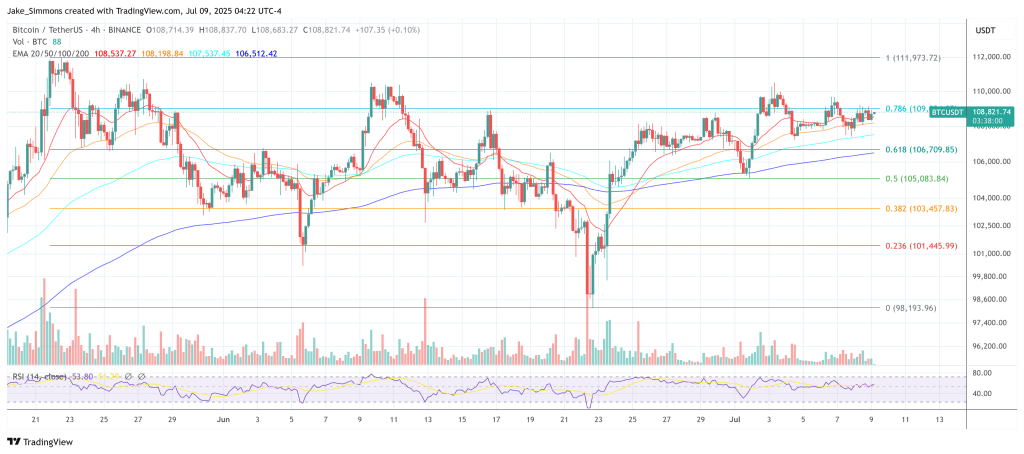US Senate Unleashes Sanctions On Bukele’s Bitcoin Gamble—Will El Salvador Double Down?
Washington draws a red line on crypto sovereignty—with El Salvador in the crosshairs.
The Hammer Drops
A new Senate bill takes direct aim at President Nayib Bukele’s Bitcoin legal tender law, threatening sanctions that could freeze the country out of dollar markets. No specifics on dollar amounts yet—just old-school political muscle flexing.
Volcano Bonds Meet Cold War Tactics
The move throws shade on El Salvador’s Bitcoin-backed bonds and mining ops, framing them as systemic risks. Because nothing says ‘financial stability’ like weaponizing SWIFT access, right?
Bukele’s Endgame
Watch for Salvadoran countermoves: doubling down on mining infrastructure or—plot twist—dumping Treasury holdings. Either way, a masterclass in how geopolitics becomes crypto’s new beta test.
Meanwhile, Wall Street still can’t decide if this is ‘emerging market innovation’ or ‘how to lose your IMF lifeline in 10 days.’
Dems Target El Salvadors Bitcoin Strategy
The bill WOULD trigger full economic-blockading powers under the International Emergency Economic Powers Act, freeze US-controlled assets of thirteen named Salvadoran officials—including Bukele, Vice-President Félix Ulloa and the president of the Central Reserve Bank—and revoke their visas. It also compels US directors at the World Bank, International Monetary Fund (IMF) and other multilaterals to vote against new loans to San Salvador while cutting off direct US assistance.
Section 5 is the measure’s Bitcoin fulcrum. Within 90 days of enactment, the Secretary of State, in consultation with Treasury, must deliver “a report on the actions of officials of the Government of El Salvador, including President Nayib Bukele, to use cryptocurrency as a mechanism for gross corruption, graft, and sanctions evasion,” together with wallet addresses, exchange counterparties and an estimate of the state’s Bitcoin stash.
That language resurrects concerns first formalized in the bipartisan Accountability for Cryptocurrency in El Salvador (ACES) Act of 2022, which ordered a risk assessment of Bukele’s original 2021 bitcoin Law. In January this year, Bukele’s super-majority quietly stripped Bitcoin of its legal-tender status—part of an IMF rescue deal—though the asset remains accepted for payments and sits on the treasury’s balance sheet.
The sponsors insist the sanctions push is foremost a human-rights response. “Under President Bukele, tens of thousands of Salvadorans and even US residents remain jammed in megaprisons without due process,” Kaine said on introduction. Van Hollen added that Bukele is “taking American taxpayer dollars to imprison people as part of a scheme to violate their constitutional rights,” while Padilla called the crackdown “abhorrent” and said economic penalties are “a necessary step.”
Yet the text’s Bitcoin provisions signal Washington’s broader anxiety that a dollarized economy holding un-audited Bitcoin reserves could morph into a sanctions-evasion node—particularly if the TRUMP administration were to soften scrutiny. The bill would force the State and Treasury departments to expose addresses, custodians and governance arrangements for the Salvadoran wallets.
Related Reading: Bitcoin Volatility Hits Bull Cycle Low – Bollinger Bands Signal Potential Breakout
Bukele, never shy on social media, greeted the proposal with characteristic derision. “HAHAHAHAHAHAHA the Dems are just salty…” he wrote on X shortly after the bill went public.
Because S. 2058 invokes §502B of the Foreign Assistance Act, any committee member can force it to the floor if the State Department fails to furnish the mandated reports—an arcane privilege the sponsors have already flagged they are prepared to use. Still, Republicans have yet to signal support, and the House remains an open question.
If the measure passes intact, the WHITE House would have ten days to list sanctioned individuals and 90 days to deliver the report. Sanctions could not be lifted for at least four years, and only after a presidential certification that El Salvador has ceased both its mass-detention state of exception and any Bitcoin-enabled sanctions evasion, according to the proposed bill.
At press time, BTC traded at $108,821.


